Taking the Riens ...
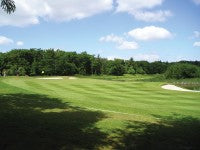 In a wonderfully wooded part of Holland, the Golf Society of Lage Vuursche has opted for a very open and distinctly American style golf course.
In a wonderfully wooded part of Holland, the Golf Society of Lage Vuursche has opted for a very open and distinctly American style golf course.
Ever-present water hazards, acres of bunkering, significant earth-mounding and often vast, sloping greens have all been expertly designed by renowned American golf course architects Robert Trent Jones II and Kyle Phillips.
The degree of playing difficulty is high, which ensures that players are continually challenged, especially with all the hazards creating several tight drives and placing a premium on excellent approach work. Serpentine shaped canals and a number of lakes come into play on twelve holes, whilst adroit and sometimes raised bunkering wait to catch an errant shot. The large greens are easy to find, but it takes courage to block so many prominent hazards from a player's mind.
It opened for play in 2000, and was an ambitious restoration project which aimed to revert flat farmland back to its former glory of rolling terrain flanked by woodland. Since opening, work has not stopped, with considerable tree planting and natural maturity helping the overall course condition. Ten years on and the 6900 yard De Lage Vuursche has firmly established itself as one of Holland's best courses. It is considered a special course but, with more maturity and constant maintenance needed, it is a tough job for head greenkeeper, Rien Hardeman.
Tell us a bit about your background and education?
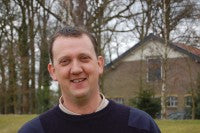 I was born in Amersfoort, near Utrecht in Holland, where our house had quite a large garden, about 25 metres deep with a disused school field behind it. I used to play with my friends on the field, sometimes digging it up. So, even when I was five years old, I knew that I wanted to be on 'the green side of life'. My father was a keen gardener and he, more than anyone, helped sow the seeds for my eventual career, and most of my siblings. I have three brothers and one sister, and all, bar one brother, work with plants - my sister with flowers; a brother as a tree surgeon; and another with me at De Lage Vuursche.
I was born in Amersfoort, near Utrecht in Holland, where our house had quite a large garden, about 25 metres deep with a disused school field behind it. I used to play with my friends on the field, sometimes digging it up. So, even when I was five years old, I knew that I wanted to be on 'the green side of life'. My father was a keen gardener and he, more than anyone, helped sow the seeds for my eventual career, and most of my siblings. I have three brothers and one sister, and all, bar one brother, work with plants - my sister with flowers; a brother as a tree surgeon; and another with me at De Lage Vuursche.
In Holland, when you reach twelve years of age you can choose the subjects you want to study at school. As I was always keen on gardening I chose that subject to major on. Of course, we had to do the regular subjects like maths, but we are allowed to specialise in other areas. We had an outdoor area where we would learn the names of flowers, plants and trees; plant flowers, and create small flowerbeds and gardens from drawings that we were given. We would learn all the maintenance aspects of gardening there as well. As we progressed, the education became more advanced.
With this broad overview of gardening from a very young age it was no surprise that, at sixteen, when I was ready to attend college, I went to further advance my horticultural skills by attending Wellantcollege in Houten.
Wellantcollege is what we call 'a green school' in Holland and is a specialist college that runs courses in horticulture, agriculture and farming. They are not rare in Holland as we are such a 'green' country and there are many different ones, in different provinces. I mainly specialised in garden construction and maintenance techniques.
What was your first job?
After college in 1994, I got drafted to do a year's obligatory military service. This does not happen anymore but, back then, each family had to put, if possible, two boys into national service for a year. After that was over, I took the first thing that came along, and that was truck driving. Not really what I wanted to do, but it kept me busy until a position came up more suited to my passion for the outdoors.
Why did you ultimately choose greenkeeping?
By accident really! My dad didn't like me truck driving, especially in the winter and, when he was doing a job at the Hoge Kleij Golf Club near Utrecht, he asked if there were any jobs going. Luckily, the present greenkeeper had just left and he convinced them I was the man to replace him! Because I'd stumbled into the job, I wasn't really aware of the type of work that greenkeepers did - but soon learnt!
How did you come to join your present club?
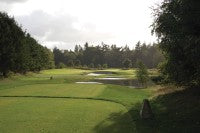 By 1999 I was a lot more confident about being a greenkeeper, and was developing itchy feet and looking for a new challenge. De Lage Vuursche is about 10km down the road from Hoge Kleij Golf Club, and jobs were being advertised a year before the course was due to open. Whilst you think you're fully prepared to apply to what was going to be a very prestigious golf club in Holland, in practice, you're not. But, the interview went well and I was informed I had the job, but had to wait for De Lage Vuursche to open.
By 1999 I was a lot more confident about being a greenkeeper, and was developing itchy feet and looking for a new challenge. De Lage Vuursche is about 10km down the road from Hoge Kleij Golf Club, and jobs were being advertised a year before the course was due to open. Whilst you think you're fully prepared to apply to what was going to be a very prestigious golf club in Holland, in practice, you're not. But, the interview went well and I was informed I had the job, but had to wait for De Lage Vuursche to open.
In the intervening time I joined a golf contractor for a few months to gain more experience and knowledge. So, in 2000 I started at De Lage Vuursche as greenkeeper and mechanic, with special responsibility for looking after all the machinery.
What sort of a club is De Lage Vuursche, and how does it compare to others in Holland?
There are about 200 golf clubs in Holland, but De Lage Vuursche is one of the top five most prestigious. It is an 18 hole course based on 60 hectares of land with around 750 members. We are a relatively new operation, and have an extremely high maintenance standard compared to other Dutch clubs. This is because, when it opened, the management company wanted to 'raise the standard' by 50% to that of other golf clubs in Holland - in fact, the plan was to make it THE finest golf club in Holland.
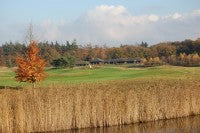 And the management is different in that it is not controlled by a big committee, but owned by a management company called Golfexploitatiemaatschappij De Lage Vuursche.
And the management is different in that it is not controlled by a big committee, but owned by a management company called Golfexploitatiemaatschappij De Lage Vuursche.
All members at golf clubs in Holland are also shareholders in the management companies, not like in the UK where having members as shareholders is extremely rare.
It keeps the chain of command simple and I am in direct contact with the Managing Director of the course on a daily basis who, in turn, reports directly to the management company. Budgets are approved very quickly. There is never really a problem with getting money approved if I need new machinery quickly. I don't have a problem with member's queries as the MD at the club was originally a head greenkeeper, so he answers all their questions and feeds them back to me. At my previous golf club, the head greenkeeper would lose hours of working time answering questions from committees. I don't have to worry about that here.
How many staff are you in charge of and what do your day to day duties involve?
 I keep very busy looking after my staff of nine. I compile and manage yearly and monthly budgets, construct weekly maintenance plans with my deputy who then plans the day to day schedule for the staff. I have complete control over the procurement of materials like grass seed and fertilisers.
I keep very busy looking after my staff of nine. I compile and manage yearly and monthly budgets, construct weekly maintenance plans with my deputy who then plans the day to day schedule for the staff. I have complete control over the procurement of materials like grass seed and fertilisers.
I find out about new machinery and techniques mainly by going to Papendal, which is basically a Dutch version of Harrogate. I speak to lots of greenkeepers there and we discuss different techniques, I feel that this is the best way to learn. I also have a good look at new machinery and products on the market and, every other year, I travel to the big golf show in the US as well.
Like all greenkeepers today, I think, our job doesn't just finish with the maintenance of grass. We also have to do the inventory for other types of maintenance on the course, including repairing benches, replacing flags and signs. All of those activities are taken care of by my staff - we are completely self sufficient.
What do you think the main differences are between your role as a greenkeeper and one in the UK?
Amongst some of the main differences is education. As I said earlier, I was able to choose what I wanted to do when I was twelve, so that is when I basically started my training, in the UK you don't start that early! Although I've never worked in the UK, I believe the recognition of a greenkeeper's job is understood. Whilst here in Holland, you could be in a bar having a drink and someone asks you what you do for a job - say 'greenkeeper' and they look totally confused!
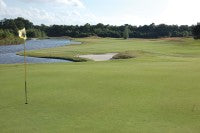 I feel that working with a Management Company (made up of three people) is definitely easier than spending hours arguing my point with a committee, like in the UK. Committees are usually made up of people who are retired and have too much time on their hands. They become too involved and this holds everything up. I am able to compromise rather than argue when I require something.
I feel that working with a Management Company (made up of three people) is definitely easier than spending hours arguing my point with a committee, like in the UK. Committees are usually made up of people who are retired and have too much time on their hands. They become too involved and this holds everything up. I am able to compromise rather than argue when I require something.
Another big difference that a greenkeeper in Holland has compared to the UK is the use of fungicides and pesticides. Up until three years ago we weren't allowed to use anything for tackling pest problems and things such as dollar spot etc. In the UK you can pretty much use anything. However, in 2007, EU changed legislation here and we were allowed to start using a choice of three products: Scotts Heritage, Signum and Caramba.
However, there are still environmental groups who want to see the use of fungicides and pesticides banned because they believe they cause serious damage to the environment. I believe they are perfectly safe if they're used sensibly. The Dutch government has spent an incredible amount of money on researching the effects of fungicides and pesticides on the environment and habitats. That research was so thorough that it has satisfied a lot of critics, but you still get inevitable cynics.
In the UK, we have the British and International Golf Greenkeepers Association (BIGGA), are you a member of any such association in Holland?
I am a member of the NGA (Netherlands Greenkeeper Association) and we work closely with FEGGA (Federation of European Golf Greenkeepers Association). There is also a Groundsman's organisation in Holland, but greenkeepers don't have much interaction with them whatsoever; there are no tie ups at all and I don't even know the name if it!
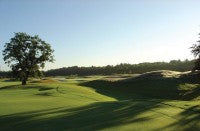 I like to come over to the BIGGA show in Harrogate every year, last time I also visited a UK golf club. I was very surprised to see a sign that read 'No Women and Dogs Allowed'! This took me back somewhat as I, and all of Holland, don't see any difference whatsoever with women playing golf. There is no issue here.
I like to come over to the BIGGA show in Harrogate every year, last time I also visited a UK golf club. I was very surprised to see a sign that read 'No Women and Dogs Allowed'! This took me back somewhat as I, and all of Holland, don't see any difference whatsoever with women playing golf. There is no issue here.
Is there a difference between Dutch soil and that in the UK?
In Holland we have a lot of different soil types. In fact, De Lage Vuursche is built on pure white sand. The last Ice Age stopped about two to three kilometres short of Utrecht and forced white sand into this area. The white sand that you see in our bunkers is the same white sand that the course sits on - we haven't had to import any sand whatsoever! The golf course constructors just laid down some 'organic matter' and fertilisers, which gave us enough to grow grass on.
Do you think the seasons are that different from the UK?
I think the main difference is that the UK has heavier rainy seasons. We have 600 sprinklers placed all over the course, so this covers us for the drier periods. We also have a very good drainage system that is superb in the wetter months. The summer months reach a similar temperature to that in Southern England, between 20-25OC.
Because the land is so flat in Holland, does this affect the construction/ maintenance methods?
Well, yes. Because the land is very flat, the Dutch golf course constructors have become experts in building man-made hills. If we want a hill out here we have to build it, this is common practice now! The course was designed with a lot of eventualities in mind. I would say the main problem is that, every now and again, we get a problem with water building up in the lower laying land (running down from the hills), our drainage system eventually deals with this though, so we don't get any real big problems.
We always like to ask anyone we interview 'what's in your shed'?
The pulling power is provided by Carraro tractors with Ransomes Jacobsen and Toro mowers, along with a Charterhouse Verti-Drain and Charterhouse Verti-Core. We also have Cushman Turf-Trucksters and an electric EZ-GO buggy to move staff about - they help to keep the noise down for the people playing on the course.
Tell us about your Verti-Drain and why you bought it?
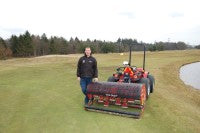 It's a 7215 model and we bought it because it's Dutch made, and also for a lot of other reasons! We bought it eight years ago from a local dealer, Gebr. Bonenkamp, where we also bought the Carraro tractors from. I was used to working with them at my previous golf course. We'd had one for over fifteen years, so I knew they were reliable. My old boss always said that, when Redexim Charterhouse put something onto the market, you know it is going to be quality and it has never let me down.
It's a 7215 model and we bought it because it's Dutch made, and also for a lot of other reasons! We bought it eight years ago from a local dealer, Gebr. Bonenkamp, where we also bought the Carraro tractors from. I was used to working with them at my previous golf course. We'd had one for over fifteen years, so I knew they were reliable. My old boss always said that, when Redexim Charterhouse put something onto the market, you know it is going to be quality and it has never let me down.
It's the original and best aerator; other companies are just following their lead. It may not be the quickest paced aerator on the market, but it does a thorough job.
We have a word for a piece of machinery in Holland, and that's 'Degelijk' (pronounced 'Day-ge-lict'), which means reliable and trustworthy, and a vertidrain is definitely 'Degelijk!' I like the fact that you can adjust the angles of the tines, change the working speed, it's relatively quiet and you can use a good choice of tines for different working depths.
What's your opinion on aeration?
We don't really have a problem with the ground being too hard or dry for aeration, as we have such a good irrigation system. However, I won't aerate if the weather is too wet, this will cause more damage than good! You will soon know if the ground is too wet as a lot of water will come out of the ground as soon as you start vertidraining. I like to aerate the greens about four or five times a year and the tees about two or three times a year. I like to do this in March, if it's not too wet, (8mm tines), April (8mm tines) and again in October with larger 12mm tines with a different angle to break up the soil. For the fairways, I use a contractor twice a year as it is such a huge job. The contractor has four 7626 Verti-Drains - the largest Verti-Drain machine that Redexim Charterhouse make.
Finally, how has the recession affected the golf market in Holland?
At De Lage Vuursche, we haven't really been affected by the recession. The one difference I would say is that we used to have a big waiting list for membership before the recession, now we don't have a waiting list! As far as existing members are concerned, there is no change. In fact, to 'up' the standard even more, I have just taken on another employee. This is also because the members requested changes and, to make those changes, I needed another man, so we went ahead!
